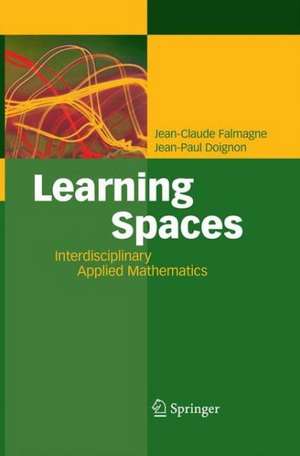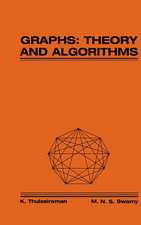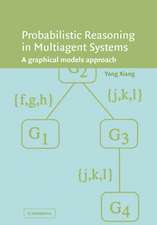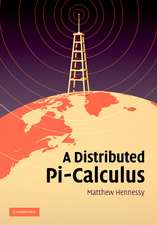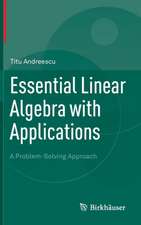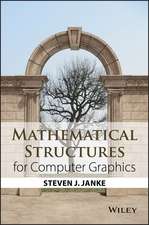Learning Spaces: Interdisciplinary Applied Mathematics
Autor Jean-Claude Falmagne, Jean-Paul Doignonen Limba Engleză Paperback – 28 noi 2014
Leaning spaces have become the essential structures to be used in assessing students' competence of various topics. A practical example is offered by ALEKS, a Web-based, artificially intelligent assessment and learning system in mathematics and other scholarly fields. At the heart of ALEKS is an artificial intelligence engine that assesses each student individually and continously.
The book is of interest to mathematically oriented readers in education, computer science, engineering, and combinatorics at research and graduate levels. Numerous examples and exercises are included, together with an extensive bibliography.
| Toate formatele și edițiile | Preț | Express |
|---|---|---|
| Paperback (1) | 1114.52 lei 6-8 săpt. | |
| Springer Berlin, Heidelberg – 28 noi 2014 | 1114.52 lei 6-8 săpt. | |
| Hardback (1) | 1119.38 lei 6-8 săpt. | |
| Springer Berlin, Heidelberg – 14 sep 2010 | 1119.38 lei 6-8 săpt. |
Preț: 1114.52 lei
Preț vechi: 1359.17 lei
-18% Nou
Puncte Express: 1672
Preț estimativ în valută:
213.26€ • 222.66$ • 176.50£
213.26€ • 222.66$ • 176.50£
Carte tipărită la comandă
Livrare economică 04-18 aprilie
Preluare comenzi: 021 569.72.76
Specificații
ISBN-13: 9783642422775
ISBN-10: 3642422772
Pagini: 436
Ilustrații: XV, 417 p.
Dimensiuni: 155 x 235 x 23 mm
Greutate: 0.61 kg
Ediția:2011
Editura: Springer Berlin, Heidelberg
Colecția Springer
Locul publicării:Berlin, Heidelberg, Germany
ISBN-10: 3642422772
Pagini: 436
Ilustrații: XV, 417 p.
Dimensiuni: 155 x 235 x 23 mm
Greutate: 0.61 kg
Ediția:2011
Editura: Springer Berlin, Heidelberg
Colecția Springer
Locul publicării:Berlin, Heidelberg, Germany
Public țintă
ResearchCuprins
Overview and Mathematical Glossary.- Knowledge Structures and Learning Spaces.- Knowledge Spaces.- Well-Graded Families.- Surmise Systems.- Skill Maps, Labels and Filters.- Entailments and the Maximal Mesh.- Galois Connections.- Descriptive and Assessment Languages.- Greedoids, Learning Spaces, and Antimatroids.- Learning Spaces and Media.- Probabilistic Knowledge Structures.- Stochastic Learning Paths.- A Continuous Markov Procedure.- A Markov Chain Procedure.- Building a Knowledge Structure.- Building a Learning Space.- Applications.- Open Problems
Recenzii
From the reviews:
“The book deals with the construction of knowledge spaces and learning spaces … . Thus, the creative mathematician will find material capable of entertaining him or her for some time. The practitioner may be interested in applications. … there is no doubt that reading and working with this book will be rewarding for the mathematician and useful for scientists from very different areas. In many aspects it has the potential to serve as a guideline to a new and theoretically better founded form of psychometry.” (Reinhard Suck, SIAM Review, Vol. 54 (2), 2012)
“This book is an enlarged second edition of the 1999 ‘Knowledge Spaces’ by the same authors. … The authors cover both deterministic and probabilistic models, justify their findings and give good examples and applications, such as pattern recognition and medical diagnosis. … We recommend it to doctoral and postdoctoral studies.” (George Stoica, Zentralblatt MATH, Vol. 1205, 2011)
“The book deals with the construction of knowledge spaces and learning spaces … . Thus, the creative mathematician will find material capable of entertaining him or her for some time. The practitioner may be interested in applications. … there is no doubt that reading and working with this book will be rewarding for the mathematician and useful for scientists from very different areas. In many aspects it has the potential to serve as a guideline to a new and theoretically better founded form of psychometry.” (Reinhard Suck, SIAM Review, Vol. 54 (2), 2012)
“This book is an enlarged second edition of the 1999 ‘Knowledge Spaces’ by the same authors. … The authors cover both deterministic and probabilistic models, justify their findings and give good examples and applications, such as pattern recognition and medical diagnosis. … We recommend it to doctoral and postdoctoral studies.” (George Stoica, Zentralblatt MATH, Vol. 1205, 2011)
Notă biografică
Jean-Paul Doignon is a professor at the mathematics department of the Université Libre de Bruxelles, Belgium. His research covers various aspects of discrete mathematics (graphs, ordered sets, convex polytopes, etc.) and applications to behavioral sciences (preference modeling, choice representation, knowledge assessment, etc.). Jean-Claude Falmagne is emeritus professor of cognitive sciences at the University of California, Irvine. His research interests span various areas, focusing on the application of mathematics to educational technology, psychophysics, choice theory, and the philosophy of science, in particular measurement theory.
Textul de pe ultima copertă
Learning spaces offer a rigorous mathematical foundation for various practical systems of knowledge assessment. An example is offered by the ALEKS system (Assessment and LEarning in Knowledge Spaces), a software for the assessment of mathematical knowledge. From a mathematical standpoint, learning spaces as well as knowledge spaces (which made the title of the first edition) generalize partially ordered sets. They are investigated both from a combinatorial and a stochastic viewpoint. The results are applied to real and simulated data. The book gives a systematic presentation of research and extends the results to new situations. It is of interest to mathematically oriented readers in education, computer science and combinatorics at research and graduate levels. The text contains numerous examples and exercises, and an extensive bibliography.
Caracteristici
Introduces learning space as a special case of knowledge space. Exposes theory and several applications of learning spaces and ancillary assessment procedures. Presents ALEKS as a practical application of learning spaces for an efficient web based learning environment. Includes supplementary material: sn.pub/extras
